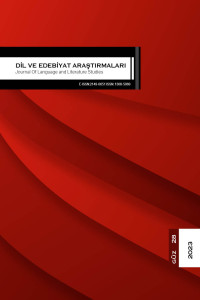Öz
Kaynakça
- Aijaz, Ahmad. (1995). “The politics of literary postcoloniality’. Race and class. 36, 3. 1-20.
- Bahri, Deepika. (1995). “Once more with feeling: What is postcolonialism?” ARIEL: A review of international English literature. January, 26:1, 51-82.
- Boehmer, Elleke. (2005). Colonial and postcolonial literature: Migrant metaphors. 2nd edition. Oxford: Oxford University Press.
- Boehmer, Elleke. (2018). Postcolonial poetics: 21st-century critical readings. London: Palgrave Macmillan.
- Childs, P. & Williams, R. J. P. (1997). An introduction to post-colonial theory. London & New York: Prentice Hall.
- Dirlik, Arif. (1994). “The postcolonial aura: third world criticism in the age of global capitalism”. Critical inquiry. Winter 20. 328-355.
- Kureishi, Hanif. (1995). The black album. London: Faber.
- McClintock, Anne. (1994). “The angel of progress: pitfalls or the term ‘postcolonialism’”, in Barker, F., Hulme, P. & Iversen, M. (ed.) (1994) Colonial discourse / postcolonial theory. Manchester & NewYork: Manchester University Press.
- McHale, Brian. (1987). Postmodernist fiction. New York and London: Methuen.
- Mishra, Vijay & Hodge, Bob. (1991). “What is post(-)colonialism?”, Textual practice. Winter, Vol. 5, No. 3. 399-414.
- Roy, Arundhati. (1997). The god of small things. London: Flamingo.
- Rushdie, Salman. (1981). Midnight’s children. London: Jonathan Cape.
- Rushdie, Salman. (1988). The satanic verses. London: Viking.
- Rushdie, Salman. (1991). Imaginary homelands. London: Granta.
- Slemon, Stephen. (1991). “Modernism’s last post” in Ian Adam & Helen Tiffin (eds.) Past the last post: Theorising post-colonialism and post-modernism. Hemel Hempstead: Harvester Wheatsheaf. 1-12.
Öz
The deployment of humour and sadness together in postcolonial literature invites im- portant discussions on ambivalence. These two juxtaposing themes in postcolonial nov- els reflect not only the cultural clashes effectively, but also the emotional ambivalence of the characters. While the use of humour and sadness turns the anti-colonial novels into sub-historical texts, the tragi-comedy created in this context provides an opportunity to view history from an individual perspective and re-interpret it. This can be observed within the early novels of Salman Rushdie, particularly in Shame, Midnight’s Children, and The Satanic Verses, Hanif Kureishi and Arundhati Roy. The excerpts taken from these novels indicate that the cultural clashes occurred by the confrontation of Eastern and Western cul- tures inevitably bring humour and sadness together. Yet, the occurrence of these juxtaposing uses of humour and sadness reveals an emotional ambivalence as well as cultural ambiva- lence of the main sub-continental characters in these works. This paper, therefore, argues that colonial practices, as represented in Rushdie, Kureishi and Roy’s novels in question, function to create a juxtapositional unity of humour and sadness that create the emotional ambivalence of colonial subjects who are not only hybridized culturally but also trauma- tized individually.
Kaynakça
- Aijaz, Ahmad. (1995). “The politics of literary postcoloniality’. Race and class. 36, 3. 1-20.
- Bahri, Deepika. (1995). “Once more with feeling: What is postcolonialism?” ARIEL: A review of international English literature. January, 26:1, 51-82.
- Boehmer, Elleke. (2005). Colonial and postcolonial literature: Migrant metaphors. 2nd edition. Oxford: Oxford University Press.
- Boehmer, Elleke. (2018). Postcolonial poetics: 21st-century critical readings. London: Palgrave Macmillan.
- Childs, P. & Williams, R. J. P. (1997). An introduction to post-colonial theory. London & New York: Prentice Hall.
- Dirlik, Arif. (1994). “The postcolonial aura: third world criticism in the age of global capitalism”. Critical inquiry. Winter 20. 328-355.
- Kureishi, Hanif. (1995). The black album. London: Faber.
- McClintock, Anne. (1994). “The angel of progress: pitfalls or the term ‘postcolonialism’”, in Barker, F., Hulme, P. & Iversen, M. (ed.) (1994) Colonial discourse / postcolonial theory. Manchester & NewYork: Manchester University Press.
- McHale, Brian. (1987). Postmodernist fiction. New York and London: Methuen.
- Mishra, Vijay & Hodge, Bob. (1991). “What is post(-)colonialism?”, Textual practice. Winter, Vol. 5, No. 3. 399-414.
- Roy, Arundhati. (1997). The god of small things. London: Flamingo.
- Rushdie, Salman. (1981). Midnight’s children. London: Jonathan Cape.
- Rushdie, Salman. (1988). The satanic verses. London: Viking.
- Rushdie, Salman. (1991). Imaginary homelands. London: Granta.
- Slemon, Stephen. (1991). “Modernism’s last post” in Ian Adam & Helen Tiffin (eds.) Past the last post: Theorising post-colonialism and post-modernism. Hemel Hempstead: Harvester Wheatsheaf. 1-12.
Ayrıntılar
| Birincil Dil | İngilizce |
|---|---|
| Konular | Dünya Dilleri, Edebiyatı ve Kültürü (Diğer) |
| Bölüm | Araştırma Makalesi |
| Yazarlar | |
| Erken Görünüm Tarihi | 23 Ekim 2023 |
| Yayımlanma Tarihi | 25 Ekim 2023 |
| Kabul Tarihi | 3 Ağustos 2023 |
| Yayımlandığı Sayı | Yıl 2023 Sayı: 28 |
Dil ve Edebiyat Araştırmaları Dergisi Creative Commons Atıf-GayrıTicari-Türetilemez 4.0 Uluslararası Lisansı (CC BY-NC-ND 4.0) ile lisanslanmıştır.


